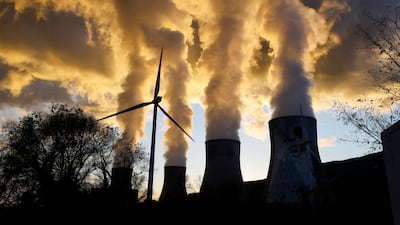Germany, the US and China are set to benefit the most from the green transition, a study showed on Tuesday, while the UK is a leading clean energy spender and the UAE has boosted its green potential through its efforts to diversify its economy.
Other countries set to gain from the green transition include Italy and Spain, according to the Predictors of Success in a Greening World report from Swiss private bank Lombard Odier and the Smith School of Enterprise and the Environment at the University of Oxford.
The study offers a 25-year perspective on countries' standing in global trade in high-growth green industries as well as the extent to which each country has directed its Covid-19 recovery spending to “build back greener”.
“As countries around the world pledge their commitment to transition to more sustainable energy and production systems, the importance of capital allocation in driving solutions to climate change has never been greater,” said Michael Urban, deputy head of sustainability research at Lombard Odier.
“It is therefore critical to accurately determine which countries, industries and companies will survive, thrive, and come to define the new industrial landscape.”
The study used two measurement frameworks to assess different countries’ abilities to capitalise on the green transition: a Green Complexity Index (GCI), to measure the number and complexity of green products competitively exported and a Green Complexity Potential (GCP), to measure each country’s average proximity to complex green products not yet competitively exported.
Some countries are well ahead of others in terms of their green endowments, with China playing an increasingly central role in the wind and solar landscape and Italy, Spain and Turkey also developing “trailblazing wind and solar companies”. Other nations are leaders in some areas but need to catch up in others.
Switzerland, for example, has strengths in some complex green products, such as railway parts and biogas equipment, but it needs to scale up renewable spending to match other regional governments such as Germany, the report found.
Meanwhile, Australia and the UAE have demonstrated huge advances in their green capabilities in recent years, with Australia possessing “immense renewable energy potential” while the Emirates has demonstrated a “clear intent to diversify”, leading to increases in its green competitiveness and potential.
Meanwhile, the UK which recently hosted the Cop26 environmental summit in Glasgow, is a leading green spender, with a high competitiveness score and above average share of Covid-19 recovery spending.
The study found that the global competitive landscape is not static, with differences in post-pandemic recovery spending able to drive changes in green capacities in the future.
For some highly-ranked GCI countries such as the Netherlands and Italy, green recovery spending is relatively low at less than 0.1 per cent of their gross domestic product. Others, like the US, Germany and China, have invested up to 1 per cent of their GDP in green recovery investments.
For investors seeking greater exposure to clean energy industries, wind and solar companies are an increasingly important focus area, the report concluded, because of the enormous growth predicted for renewable energy technologies and the position they occupy in globally integrated supply chains.
From an initial global sample of 1,700 companies, the report identifies 93 publicly-listed wind and solar companies that are optimally positioned to benefit from investor and policy-led engagement.
Looking ahead, the study said greater collaboration between policymakers and institutional investors, “to channel the substantial pool of private capital currently being targeted at the renewables sector, will play a critical role in facilitating the growth of these companies”, with European companies set to play a key role in the wind and solar transition.


